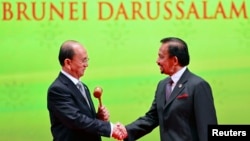Former pariah state Burma has taken another step in normalizing its international standing by taking over the rotating chairmanship of the Association of Southeast Asian Nations, or ASEAN.
At a ceremony in Brunei Thursday, Burmese President Thein Sein accepted the gavel and the responsibility to host more than 1,100 meetings in the next year.
Zaw Htay, a government spokesman in Rangoon said his country has been preparing for two years and has gotten a lot of help from its regional neighbors.
"The Sasakawa Foundation of Japan has given us financial and technical assistance, and some other countries like Singapore and South Korea have also helped us," said Htay. "With Chinese assistance, we are building a state guest house in Nepyitaw [the capital] to accommodate all the visiting heads of states. It is big enough to accommodate all the state guests together," he said.
The chairmanship follows political reforms that have led to the lifting of most international sanctions. Thein Sein's government has won praise for freeing hundreds of political prisoners, lifting censorship laws and holding elections in which many opposition members won seats in parliament.
However, the ASEAN chairmanship is being criticized by some who say the country has not done enough, pointing to continuing sectarian violence against Muslims and the country's remaining political prisoners.
Activist Aung Thu Nyein says the ASEAN chairmanship will shine a much needed spotlight on Burma's human rights record.
"There will be many human rights organizations and civil societies from various countries coming to this country during that moment," said Aung. "There will be discussions and observations about our country's situations. I therefore think the Myanmar National Human Right Commission should be more proactive so as to enhance our human rights situation," he said.
Burma, which joined ASEAN in 1997, was passed over for the chairmanship in 2006.
This report was produced in collaboration with the VOA Burmese service.
At a ceremony in Brunei Thursday, Burmese President Thein Sein accepted the gavel and the responsibility to host more than 1,100 meetings in the next year.
Zaw Htay, a government spokesman in Rangoon said his country has been preparing for two years and has gotten a lot of help from its regional neighbors.
"The Sasakawa Foundation of Japan has given us financial and technical assistance, and some other countries like Singapore and South Korea have also helped us," said Htay. "With Chinese assistance, we are building a state guest house in Nepyitaw [the capital] to accommodate all the visiting heads of states. It is big enough to accommodate all the state guests together," he said.
The chairmanship follows political reforms that have led to the lifting of most international sanctions. Thein Sein's government has won praise for freeing hundreds of political prisoners, lifting censorship laws and holding elections in which many opposition members won seats in parliament.
However, the ASEAN chairmanship is being criticized by some who say the country has not done enough, pointing to continuing sectarian violence against Muslims and the country's remaining political prisoners.
Activist Aung Thu Nyein says the ASEAN chairmanship will shine a much needed spotlight on Burma's human rights record.
"There will be many human rights organizations and civil societies from various countries coming to this country during that moment," said Aung. "There will be discussions and observations about our country's situations. I therefore think the Myanmar National Human Right Commission should be more proactive so as to enhance our human rights situation," he said.
Burma, which joined ASEAN in 1997, was passed over for the chairmanship in 2006.
This report was produced in collaboration with the VOA Burmese service.







